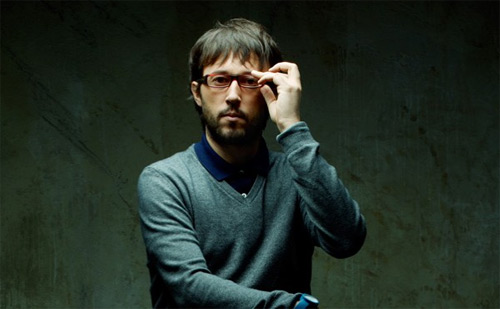Agoria, real name Sebastian Devaud, grew up in south eastern France with a strong familial connection to music. His mother was an opera singer and father, an architect-cum-record collector. Both exposed Devaud to a wide array of sounds; primarily through the parties they’d throw for their friends – open-minded affairs embracing Vangelis next to Bach. Devaud was a regular guest from the age of eight, and DJ from 10. His liberal education had begun.
Of course, when Devaud heard Inner City’s ‘Big Fun’ for the first time in 1988 (aged 12 now) a particular affiliation to uptempo electronica was established. The record, like a local Jeff Mills gig over three turntables some years later, proved a seminal moment. As an inspired teen, Devaud purchased his own Technics, learnt to mix house and techno and started properly DJing.
It was, in fact, those early Agora parties promoted with friends that would, in turn, catalyse Devaud’s world famous club alias today. At the age of 17, he opened a club night for visiting royalty Richie Hawtin and Carl Cox. Come 23, Devaud decided to abandon university studies to fully pursue his love of electronic music. A decision he’d never regret.
But, still, it was his love of performance rather than production that dominated. As he claimed in one interview earlier this month: “it actually took me a long time to go in the studio and try and make music myself.” Devaud was still enraptured by France’s vibrant rave party culture: “They [the parties] were really the shit. Police were all over it, parties were popping up and cancelled at short notice. It was something so inspiring and so new that I wanted to be part of it. Playing the drums or being in a band was something that was not so much usual, but it wasn’t the same as going every weekend to try to find a party and trying to escape the police constantly either in shit little places with 20 people or other times there were magical places in the forest with thousands of people and amazing sound.”

Devaud was not so happy with his first foray in the studio, persuaded to learn “computers” by a friend and then figure out his production style having already built considerable momentum as a DJ. But debut Agoria lick ‘Influence Hivernale’, released on Kubik France in 1999, quickly made way for more expansive outings on UMF and Future Frontier, and then a series of acclaimed productions on small French indie label Tekmicks – the series, dubbed ‘La 11eme Marche’ (2001) and serving an exhilarating helter-skelter of epic, spiralling melodies and driving underground techno rhythms, caught the influential ear of PIAS, who re-packaged it and promptly released Agoria’s critically celebrated debut album Blossom (2003).
Second long-player The Green Armchair (2006) crystallized Agoria’s further, rapid growth as an artist over the years following Blossom. Here was a record confidently mixing do-or-die techno with the powerful childhood influence of classical music, and coming up trumps. Guest contributors Peter Murphy, former singer with Brit post-punkers Bauhaus, and Neneh Cherry only added to the sense of exciting variety.
At the same time, Devaud also launched record label Infiné. Founded alongside Alexandre Cazac and Yannick Matray, Infiné avoided all existing label blueprints and wider electronic trends. Opening release, Francesco Tristano’s album Not For Piano, said it all – this bold, neo-classical reworking of everything from Derrick May’s ‘Strings Of Life’ to Jeff Mills’ ‘The Bells’ (Tristano was classically trained on piano at New York’s revered Juliard School) broke all the clubland rules and yet thrived. Subsequently, Devaud has pushed boundaries with Infiné releases via Apparat, Rone, Oxia and, most recently, Downliners Sekt. Things have never been better.
Back to Agoria’s own career path, and the last five or six years have seen an even wider scope of work without any cost to quality or reputation. Albums Go Fast (2008) and Impermanence (2011) have covered fresh house and techno ground, balancing the deep and accessible and, in the case of the latter, involving Seth Troxler, Carl Craig and singer Kid A. Whilst Agoria left Infiné in 2011, his subsequent marauding (in the best sense) production catalogue has taken in labels such as Innervisions (2013’s irresistible Ibiza EP ‘Scala’ – a smart, uplifting mix of rhythm and piano) and Rebirth. Remixes, too, have flown - tweaks to Josh Wink, FCL, Michael Mayer and, this year, Moby all landing with considerable creative thump.
All of this ignores that fact that Devaud has scored film soundtracks – for 2008 Luc Besson flick Go Fast, Devaud linking classic house to challenging sweeps of ambient sound – and co-founded Lyon’s renowned Nuit Sonores festival, one of clubland’s best expressions of contemporary electronic groove as it relates to both indie and the experimental. As Agoria, Devaud has also built a towering global reputation for immersive, truly ground-breaking DJ performance. This year alone, he has enthralled savvy audiences everywhere from Mexico (BPM) to England (Eastern Electrics, Fabric) via Japan, Brazil, the Netherlands, Belgium, Hungary and, of course, Ibiza. The list goes on and on, Agoria’s music mission nowhere near complete yet.
Words: Ben Lovett
Agoria plays for Defected In The House at Booom Ibiza Tuesday 02 September alongside Deetron, Detroit Swindle and Mark Fanciulli - click for tickets



